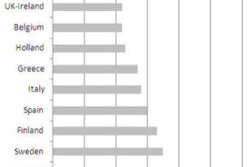
CHICAGO (Reuters Health) - Endurance athletes who run extraordinarily long distances over a sustained period of time lose muscle as well as fat, and they severely impair their immune function.
That's according to data presented at the 2010 annual meeting of the Radiological Society of North America (RSNA).
"If you do this type of sport, you have to know that it is very stressful for the immune system, that you will lose not only fat but muscle, and that no matter how much you eat, it will not be enough to sustain your body," Dr. Uwe Schutz, from University Hospital of Ulm, Germany, told Reuters Health.
Schutz and his team studied 44 runners as they competed in the TransEuropeFootRace, which took place from April 19 to June 21, 2009. The race started in southern Italy and ended in North Cape, Norway. Runners traversed a distance of 2,800 miles (4,500 kilometers) in 64 days.
Using a mobile MRI unit, the researchers studied how the runners' bodies responded to the high stress conditions of ultra-long distance running.
They found that the runners lost an average of 5.4% of their body volume during the course of the race, most of which was in the first 2,000 kilometers. They lost 40% of their body fat in the first half of the race, and 50% over the duration of the race.
Surprisingly, despite the intense daily running, the runners also lost an average of 7% of the muscle volume in their legs.
Two runners developed bone fractures, one in the pelvis, and the other in the tibia. "This shows that this amount of physical activity is too high for the body," Schutz commented.
The stress also impaired the immune system. Three runners were forced to leave the race due to rapidly growing infections. "They got a slight infection in a toe nail, and by the next day, the infection had progressed through the entire leg. This is another thing to show that it is not intelligent to do this sport," Schutz said.
The runners also lost brain volume, but this was regained a few weeks after the race, he said.
Many of the runners developed overuse injuries such as muscle strain but they continued to run despite the pain. Interestingly, the pain went away with no muscle damage.
"This is the finding that would apply most to the recreational runner or someone who runs marathons," Schutz said. "They literally ran their pain away. We usually tell runners to stop if they develop such pain, but it appears from this study that they don't have to. The problem is distinguishing the pain due to muscle inflammation from the pain due to a stress fracture, because if you continue to run on a stress fracture you may worsen it and end up with a bigger problem."
By Fran Lowry
Last Updated: 2010-12-02 14:12:38 -0400 (Reuters Health)
Related Reading
Marathoners have altered biochemistry in knee cartilage, August 16, 2010
Copyright © 2010 Reuters Limited. All rights reserved. Republication or redistribution of Reuters content, including by framing or similar means, is expressly prohibited without the prior written consent of Reuters. Reuters shall not be liable for any errors or delays in the content, or for any actions taken in reliance thereon. Reuters and the Reuters sphere logo are registered trademarks and trademarks of the Reuters group of companies around the world.



















